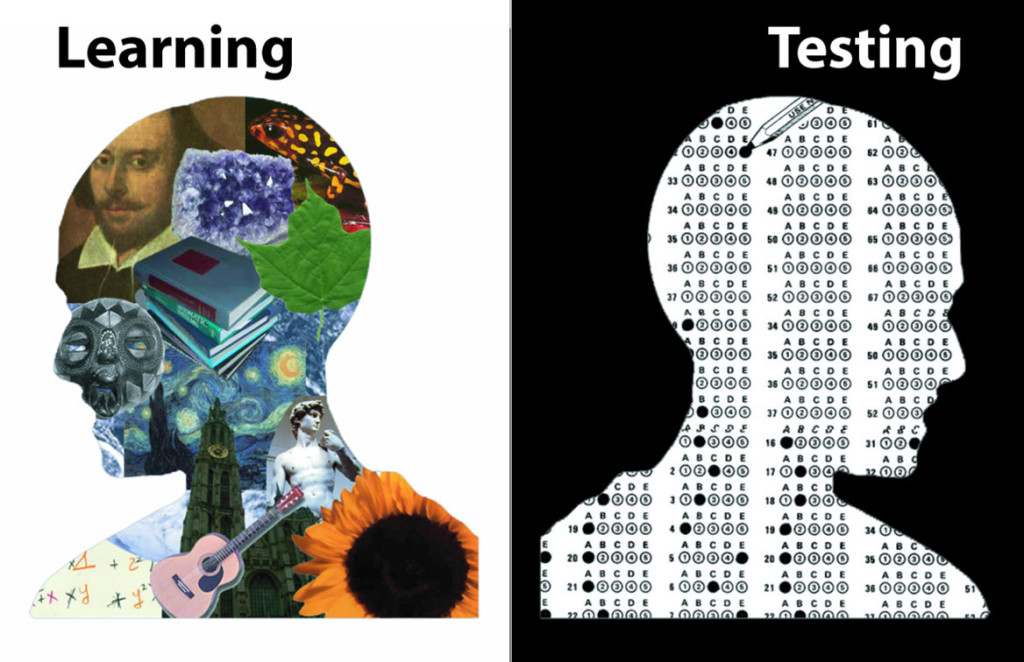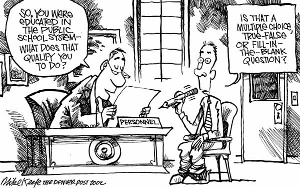The Problem with Standardized Testing
 One day, as I was explaining the philosophy of our school to an interested parent, she asked me, “Do you give those tests that kids need for college?” When I asked her if she meant the SATs, she said, “No, I mean those tests that schools give every year that will make sure students do well on the SATs.” As we continued to speak it became clear that she was talking about standardized tests – she believed that they would ensure that her child was successful on the SATs and therefore would be successful in university and in life.
One day, as I was explaining the philosophy of our school to an interested parent, she asked me, “Do you give those tests that kids need for college?” When I asked her if she meant the SATs, she said, “No, I mean those tests that schools give every year that will make sure students do well on the SATs.” As we continued to speak it became clear that she was talking about standardized tests – she believed that they would ensure that her child was successful on the SATs and therefore would be successful in university and in life.
But tests don’t ensure that students will do well on the SATs – agood education does that. Tests don’t ensure that students will do well in university – again, a good education does that.
What’s particularly sad is that testing (especially multiple-choice, standardized testing) not only doesn’t guarantee a good education, but it actually often gets in the way of a good education.
What’s wrong with standardized tests?
 They’re multiple choice. So many important criteria can’t be tested through multiple choice questions. For instance, standardized tests can’t measure things like creativity, writing skills, the ability to solve high-level math problems, or critical thinking skills (such as using history lessons to analyze current problems). Standardized tests tend to measure more superficial information that students can memorize. The more standardized tests we give, the less we are able to produce innovative, critical thinkers.
They’re multiple choice. So many important criteria can’t be tested through multiple choice questions. For instance, standardized tests can’t measure things like creativity, writing skills, the ability to solve high-level math problems, or critical thinking skills (such as using history lessons to analyze current problems). Standardized tests tend to measure more superficial information that students can memorize. The more standardized tests we give, the less we are able to produce innovative, critical thinkers.
- They lead to “teaching to the test.” Te
 achers feel pressured to teach superficial information rather than the deeper thinking skills that will help children be successful in life. When teachers focus on cramming information for an exam they no longer make time for arguing points in Socratic circles, doing research, writing essays, and conducting experiments in science labs.
achers feel pressured to teach superficial information rather than the deeper thinking skills that will help children be successful in life. When teachers focus on cramming information for an exam they no longer make time for arguing points in Socratic circles, doing research, writing essays, and conducting experiments in science labs. - They take time away from learning. Standardized tests are long and can take weeks to administer (see data in the article Standardized Testing is Completely Out of Control). Teachers waste valuable classroom time teaching kids how to be successful on multiple choice exams and administering practice exams. During this time, students are no longer learning.
- They assume that the only way to measure learning is through a test. This is so wrong. Some students don’t “test well” – but this doesn’t mean they’re not able to complete incredible projects, work cooperatively in a group, show strong leadership skills, or argue a point – all skills that will help them in life.
- They cause anxiety to such a degree that students often become paralyzed and forget information they know. They take away from the joy of learning and kill students’ natural curiosity.
Education is so much more than a test. But how can parents be sure their children are getting a good education? One of the measures is your child’s own attitude to school. Children should be curious – they should be excited by what they’re learning in school. Another measure is the kind of homework they do – instead of filling out worksheets, they should spend a good deal of time reading and writing. They should be figuring out challenging math problems (rather than slogging away at 20 or 30 practice problems). Their grades should reflect homework and project work, not simply tests and quizzes.
Parents are children’s most important teachers. Don’t just leave your children’s education in the hands of a school. Encourage your child to discover outside interests – music, art, dance, foreign languages – all of these will help your child grow intellectually and will help them develop their natural curiosity and love of learning. Help your child develop a reading habit. It has been shown that students who do best on the SATs are those that read avidly (rather than those who take SAT prep classes).
Rest assured: your child is so much more than the score on a standardized test. Leave the test anxiety behind and help your child find the true joy in learning.

very good blog, carla!
Thank you!
You hit the nail on the head with this Carla. I have always been the student that “forgot everything in an exam room” and therefore did poorly on tests. I would literally be sick to my stomach at the thought of writing an exam. I believe that we all learn in different ways and therefore should be taught differently. Great teachers are the ones that see this and actually teach each student in the way that “helps” them learn. I sure wish that some of my teachers were open enough to teach that way. You are amazing.
But…At the university what they are going to do?
If they’re able to think deeply, they’ll do fine in university.